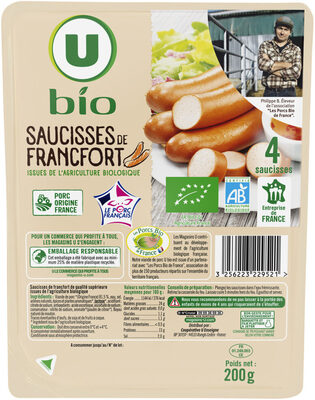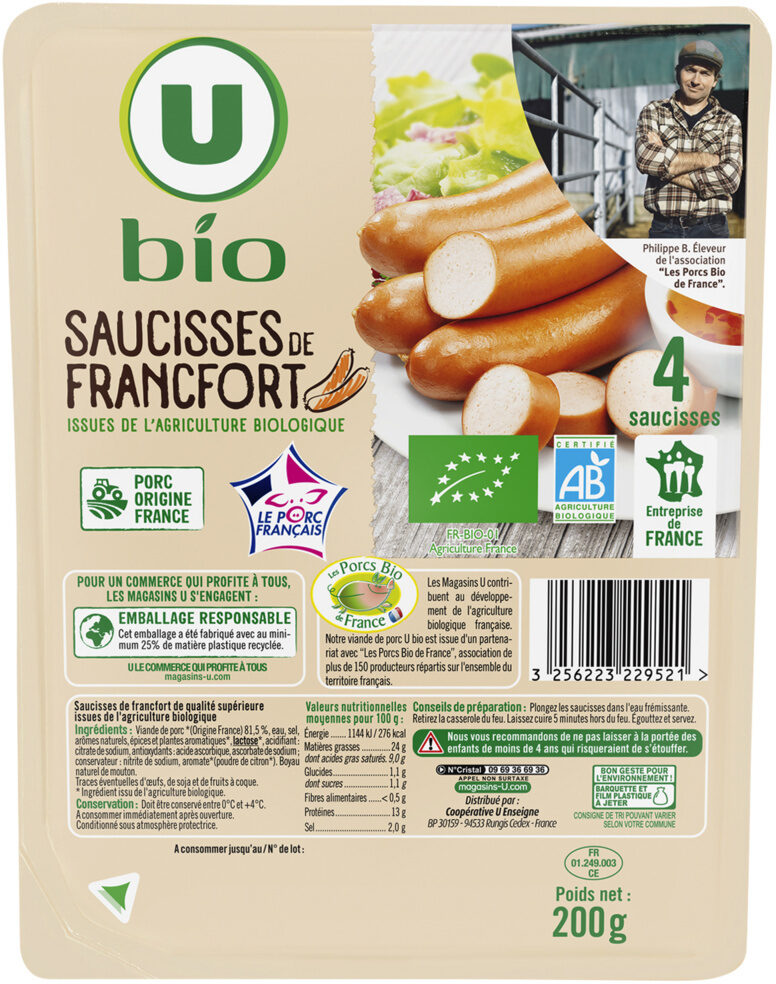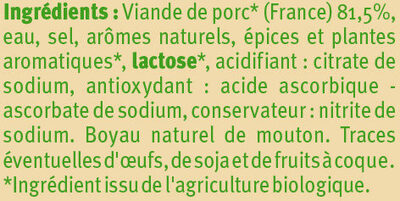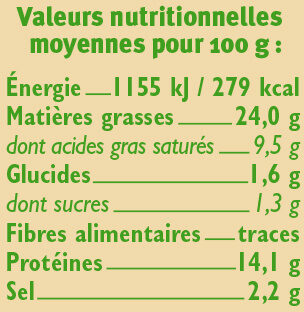Help us make food transparency the norm!
As a non-profit organization, we depend on your donations to continue informing consumers around the world about what they eat.
The food revolution starts with you!
Saucisses de Francfort Bio - U Bio - x4 soit 200 g
Saucisses de Francfort Bio - U Bio - x4 soit 200 g
This product page is not complete. You can help to complete it by editing it and adding more data from the photos we have, or by taking more photos using the app for Android or iPhone/iPad. Thank you!
×
Some of the data for this product has been provided directly by the manufacturer Système U.
Barcode: 3256223229521 (EAN / EAN-13)
Quantity: x4 soit 200 g
Packaging: Plastic, Fresh, Tray, fr:Film en plastique
Categories: Meats and their products, Meats, Prepared meats, Sausages, German sausages, Frankfurter sausages
Labels, certifications, awards:
Organic, EU Organic, French meat, FR-BIO-01, French pork, Made in France, AB Agriculture Biologique, fr:Recyclé plastique


Origin of ingredients: France
Manufacturing or processing places: France
Traceability code: FR 01.249.003 CE - Miribel (Ain, France)
Stores: Magasins U, Super U
Countries where sold: France
Matching with your preferences
Health
Ingredients
-
18 ingredients
: Viande de porc* (France) 81,5%, eau, sel, arômes naturels, épices et plantes aromatiques*, LACTOSE*, acidifiant : citrate de sodium, antioxydants : acide ascorbique, ascorbate de sodium - conservateur : nitrite de sodium, aromate*(poudre de citron*). Boyau naturel de mouton. *ingrédient issu de l'agriculture biologique Traces éventuelles d oeufs, de soja et de fruits à coqueAllergens: MilkTraces: Nuts, Soybeans
Food processing
-
Ultra processed foods
Elements that indicate the product is in the 4 - Ultra processed food and drink products group:
- Ingredient: Flavouring
- Ingredient: Lactose
Food products are classified into 4 groups according to their degree of processing:
- Unprocessed or minimally processed foods
- Processed culinary ingredients
- Processed foods
- Ultra processed foods
The determination of the group is based on the category of the product and on the ingredients it contains.
Additives
-
E250 - Sodium nitrite
Sodium nitrite: Sodium nitrite is the inorganic compound with the chemical formula NaNO2. It is a white to slightly yellowish crystalline powder that is very soluble in water and is hygroscopic. It is a useful precursor to a variety of organic compounds, such as pharmaceuticals, dyes, and pesticides, but it is probably best known as a food additive to prevent botulism. It is on the World Health Organization's List of Essential Medicines, the most important medications needed in a basic health system.Nitrate or nitrite -ingested- under conditions that result in endogenous nitrosation has been classified as "probably carcinogenic to humans" by International Agency for Research on Cancer -IARC-.Source: Wikipedia
-
E301 - Sodium ascorbate
Sodium ascorbate: Sodium ascorbate is one of a number of mineral salts of ascorbic acid -vitamin C-. The molecular formula of this chemical compound is C6H7NaO6. As the sodium salt of ascorbic acid, it is known as a mineral ascorbate. It has not been demonstrated to be more bioavailable than any other form of vitamin C supplement.Sodium ascorbate normally provides 131 mg of sodium per 1‚000 mg of ascorbic acid -1‚000 mg of sodium ascorbate contains 889 mg of ascorbic acid and 111 mg of sodium-. As a food additive, it has the E number E301 and is used as an antioxidant and an acidity regulator. It is approved for use as a food additive in the EU, USA, and Australia and New Zealand.In in vitro studies, sodium ascorbate has been found to produce cytotoxic effects in various malignant cell lines, which include melanoma cells that are particularly susceptible.Source: Wikipedia
-
E331 - Sodium citrates
Sodium citrate: Sodium citrate may refer to any of the sodium salts of citrate -though most commonly the third-: Monosodium citrate Disodium citrate Trisodium citrateThe three forms of the salt are collectively known by the E number E331. Sodium citrates are used as acidity regulators in food and drinks, and also as emulsifiers for oils. They enable cheeses to melt without becoming greasy.Source: Wikipedia
Ingredients analysis
-
Palm oil free
No ingredients containing palm oil detected
Unrecognized ingredients: fr:traces-eventuelles-d-oeufs, fr:de-soja-et-de-fruits-a-coqueSome ingredients could not be recognized.
We need your help!
You can help us recognize more ingredients and better analyze the list of ingredients for this product and others:
- Edit this product page to correct spelling mistakes in the ingredients list, and/or to remove ingredients in other languages and sentences that are not related to the ingredients.
- Add new entries, synonyms or translations to our multilingual lists of ingredients, ingredient processing methods, and labels.
If you would like to help, join the #ingredients channel on our Slack discussion space and/or learn about ingredients analysis on our wiki. Thank you!
-
Non-vegan
Non-vegan ingredients: Pork meat, LactoseSome ingredients could not be recognized.
We need your help!
You can help us recognize more ingredients and better analyze the list of ingredients for this product and others:
- Edit this product page to correct spelling mistakes in the ingredients list, and/or to remove ingredients in other languages and sentences that are not related to the ingredients.
- Add new entries, synonyms or translations to our multilingual lists of ingredients, ingredient processing methods, and labels.
If you would like to help, join the #ingredients channel on our Slack discussion space and/or learn about ingredients analysis on our wiki. Thank you!
-
Non-vegetarian
Non-vegetarian ingredients: Pork meatSome ingredients could not be recognized.
We need your help!
You can help us recognize more ingredients and better analyze the list of ingredients for this product and others:
- Edit this product page to correct spelling mistakes in the ingredients list, and/or to remove ingredients in other languages and sentences that are not related to the ingredients.
- Add new entries, synonyms or translations to our multilingual lists of ingredients, ingredient processing methods, and labels.
If you would like to help, join the #ingredients channel on our Slack discussion space and/or learn about ingredients analysis on our wiki. Thank you!
-
Details of the analysis of the ingredients
We need your help!
Some ingredients could not be recognized.
We need your help!
You can help us recognize more ingredients and better analyze the list of ingredients for this product and others:
- Edit this product page to correct spelling mistakes in the ingredients list, and/or to remove ingredients in other languages and sentences that are not related to the ingredients.
- Add new entries, synonyms or translations to our multilingual lists of ingredients, ingredient processing methods, and labels.
If you would like to help, join the #ingredients channel on our Slack discussion space and/or learn about ingredients analysis on our wiki. Thank you!
: Viande de porc 81.5%, eau, sel, arômes naturels, épices et plantes aromatiques, LACTOSE, acidifiant (citrate de sodium), antioxydants (acide ascorbique), ascorbate de sodium, conservateur (nitrite de sodium), aromate (poudre de citron), Boyau naturel de mouton, Traces éventuelles d oeufs, de soja et de fruits à coque- Viande de porc -> en:pork-meat - labels: en:organic - vegan: no - vegetarian: no - ciqual_proxy_food_code: 28205 - percent_min: 81.5 - percent: 81.5 - percent_max: 81.5
- eau -> en:water - vegan: yes - vegetarian: yes - ciqual_food_code: 18066 - percent_min: 1.42307692307692 - percent_max: 18.5
- sel -> en:salt - vegan: yes - vegetarian: yes - ciqual_food_code: 11058 - percent_min: 0 - percent_max: 2
- arômes naturels -> en:natural-flavouring - vegan: maybe - vegetarian: maybe - percent_min: 0 - percent_max: 2
- épices et plantes aromatiques -> en:herbs-and-spices - labels: en:organic - vegan: yes - vegetarian: yes - percent_min: 0 - percent_max: 2
- LACTOSE -> en:lactose - labels: en:organic - vegan: no - vegetarian: yes - percent_min: 0 - percent_max: 2
- acidifiant -> en:acid - percent_min: 0 - percent_max: 2
- citrate de sodium -> en:sodium-citrate - percent_min: 0 - percent_max: 2
- antioxydants -> en:antioxidant - percent_min: 0 - percent_max: 2
- acide ascorbique -> en:e300 - vegan: yes - vegetarian: yes - percent_min: 0 - percent_max: 2
- ascorbate de sodium -> en:e301 - vegan: yes - vegetarian: yes - percent_min: 0 - percent_max: 2
- conservateur -> en:preservative - percent_min: 0 - percent_max: 2
- nitrite de sodium -> en:e250 - vegan: yes - vegetarian: yes - percent_min: 0 - percent_max: 2
- aromate -> en:spice - labels: en:organic - vegan: yes - vegetarian: yes - percent_min: 0 - percent_max: 1.8974358974359
- poudre de citron -> en:lemon-powder - labels: en:organic - vegan: yes - vegetarian: yes - ciqual_food_code: 2028 - percent_min: 0 - percent_max: 1.8974358974359
- Boyau naturel de mouton -> en:natural-sheep-casing - percent_min: 0 - percent_max: 1.70769230769231
- Traces éventuelles d oeufs -> fr:traces-eventuelles-d-oeufs - percent_min: 0 - percent_max: 1.55244755244755
- de soja et de fruits à coque -> fr:de-soja-et-de-fruits-a-coque - percent_min: 0 - percent_max: 1.42307692307692
en:meat -> en:meat
en:pork -> en:pork
Nutrition
-
Bad nutritional quality
⚠ ️Warning: the amount of fruits, vegetables and nuts is not specified on the label, it was estimated from the list of ingredients: 0This product is not considered a beverage for the calculation of the Nutri-Score.
Positive points: 0
- Proteins: 5 / 5 (value: 13, rounded value: 13)
- Fiber: 0 / 5 (value: 0.5, rounded value: 0.5)
- Fruits, vegetables, nuts, and colza/walnut/olive oils: 0 / 5 (value: 0.384615384615387, rounded value: 0.4)
Negative points: 19
- Energy: 3 / 10 (value: 1144, rounded value: 1144)
- Sugars: 0 / 10 (value: 1.1, rounded value: 1.1)
- Saturated fat: 8 / 10 (value: 9, rounded value: 9)
- Sodium: 8 / 10 (value: 800, rounded value: 800)
The points for proteins are not counted because the negative points are greater or equal to 11.
Nutritional score: (19 - 0)
Nutri-Score:
-
Nutrient levels
-
Fat in high quantity (24%)
What you need to know- A high consumption of fat, especially saturated fats, can raise cholesterol, which increases the risk of heart diseases.
Recommendation: Limit the consumption of fat and saturated fat- Choose products with lower fat and saturated fat content.
-
Saturated fat in high quantity (9%)
What you need to know- A high consumption of fat, especially saturated fats, can raise cholesterol, which increases the risk of heart diseases.
Recommendation: Limit the consumption of fat and saturated fat- Choose products with lower fat and saturated fat content.
-
Sugars in low quantity (1.1%)
What you need to know- A high consumption of sugar can cause weight gain and tooth decay. It also augments the risk of type 2 diabetes and cardio-vascular diseases.
Recommendation: Limit the consumption of sugar and sugary drinks- Sugary drinks (such as sodas, fruit beverages, and fruit juices and nectars) should be limited as much as possible (no more than 1 glass a day).
- Choose products with lower sugar content and reduce the consumption of products with added sugars.
-
Salt in high quantity (2%)
What you need to know- A high consumption of salt (or sodium) can cause raised blood pressure, which can increase the risk of heart disease and stroke.
- Many people who have high blood pressure do not know it, as there are often no symptoms.
- Most people consume too much salt (on average 9 to 12 grams per day), around twice the recommended maximum level of intake.
Recommendation: Limit the consumption of salt and salted food- Reduce the quantity of salt used when cooking, and don't salt again at the table.
- Limit the consumption of salty snacks and choose products with lower salt content.
-
-
Nutrition facts
Nutrition facts As sold
for 100 g / 100 mlAs sold
per serving (50 g)Compared to: Frankfurter sausages Energy 1,144 kj
(276 kcal)572 kj
(138 kcal)+10% Fat 24 g 12 g +15% Saturated fat 9 g 4.5 g +15% Carbohydrates 1.1 g 0.55 g -32% Sugars 1.1 g 0.55 g +62% Fiber 0.5 g 0.25 g +51% Proteins 13 g 6.5 g -4% Salt 2 g 1 g +2% Fruits‚ vegetables‚ nuts and rapeseed‚ walnut and olive oils (estimate from ingredients list analysis) 0.385 % 0.385 % Carbon footprint from meat or fish 603.1 g 302 g
Environment
-
Eco-Score C - Moderate environmental impact
⚠ ️Select a country in order to include the full impact of transportation.The Eco-Score is an experimental score that summarizes the environmental impacts of food products.→ The Eco-Score was initially developped for France and it is being extended to other European countries. The Eco-Score formula is subject to change as it is regularly improved to make it more precise and better suited to each country.Life cycle analysis
-
Average impact of products of the same category: D (Score: 39/100)
Category: Frankfurter sausage
Category: Frankfurter sausage
- PEF environmental score: 0.76 (the lower the score, the lower the impact)
- including impact on climate change: 5.23 kg CO2 eq/kg of product
Stage Impact Agriculture
80.3 %Processing
8.7 %Packaging
3.2 %Transportation
2.1 %Distribution
1.2 %Consumption
4.5 %
Bonuses and maluses
-
Labels with high environmental benefits
Bonus: +15
-
AB Agriculture Biologique
Organic agriculture contributes to preserve biodiversity, climate, water quality and soil fertility.
Organic food is food produced by methods complying with the standards of organic farming and features practices that cycle resources, promote ecological balance, and conserve biodiversity.
-
EU Organic
Organic agriculture contributes to preserve biodiversity, climate, water quality and soil fertility.
Organic food is food produced by methods complying with the standards of organic farming and features practices that cycle resources, promote ecological balance, and conserve biodiversity.
-
-
Origins of ingredients with a medium impact
Bonus: +4
Environmental policy: +4
Transportation: 0
Origin of the product and/or its ingredients % of ingredients Impact France 100 %Medium
-
Packaging with a medium impact
Malus: -11
Shape Material Recycling Impact Film Plastic High Tray Unknown High ⚠ ️ The information about the packaging of this product is not sufficiently precise (exact shapes and materials of all components of the packaging).⚠ ️ For a more precise calculation of the Eco-Score, you can modify the product page and add them.
If you are the manufacturer of this product, you can send us the information with our free platform for producers.
Eco-Score for this product
-
Impact for this product: C (Score: 47/100)
Product: Saucisses de Francfort Bio - U Bio - x4 soit 200 g
Life cycle analysis score: 39
Sum of bonuses and maluses: +8
Final score: 47/100
-
Carbon footprint
-
Equal to driving 2.7 km in a petrol car
523 g CO² per 100g of product
The carbon emission figure comes from ADEME's Agribalyse database, for the category: Frankfurter sausage (Source: ADEME Agribalyse Database)
Stage Impact Agriculture
84.3 %Processing
4.9 %Packaging
4.5 %Transportation
3.9 %Distribution
0.7 %Consumption
1.8 %
Packaging
-
Packaging with a medium impact
-
Packaging parts
Film (Plastic)
Tray
-
Packaging materials
Material % Packaging weight Packaging weight per 100 g of product Plastic
-
Transportation
-
Origins of ingredients
Origins of ingredients with a medium impact
Origin of the product and/or its ingredients % of ingredients Impact France 100 %Medium
Labels
-
AB Agriculture Biologique
Organic agriculture contributes to preserve biodiversity, climate, water quality and soil fertility.
Organic food is food produced by methods complying with the standards of organic farming and features practices that cycle resources, promote ecological balance, and conserve biodiversity.
-
EU Organic
Organic agriculture contributes to preserve biodiversity, climate, water quality and soil fertility.
Organic food is food produced by methods complying with the standards of organic farming and features practices that cycle resources, promote ecological balance, and conserve biodiversity.
Report a problem
-
Incomplete or incorrect information?
Category, labels, ingredients, allergens, nutritional information, photos etc.
If the information does not match the information on the packaging, please complete or correct it. Open Food Facts is a collaborative database, and every contribution is useful for all.
Data sources
Product added on by openfoodfacts-contributors
Last edit of product page on by packbot.
Product page also edited by date-limite-app, jecrivaine, kiliweb, org-systeme-u, roboto-app, sebleouf, systeme-u, systeme-u-off, teolemon.












